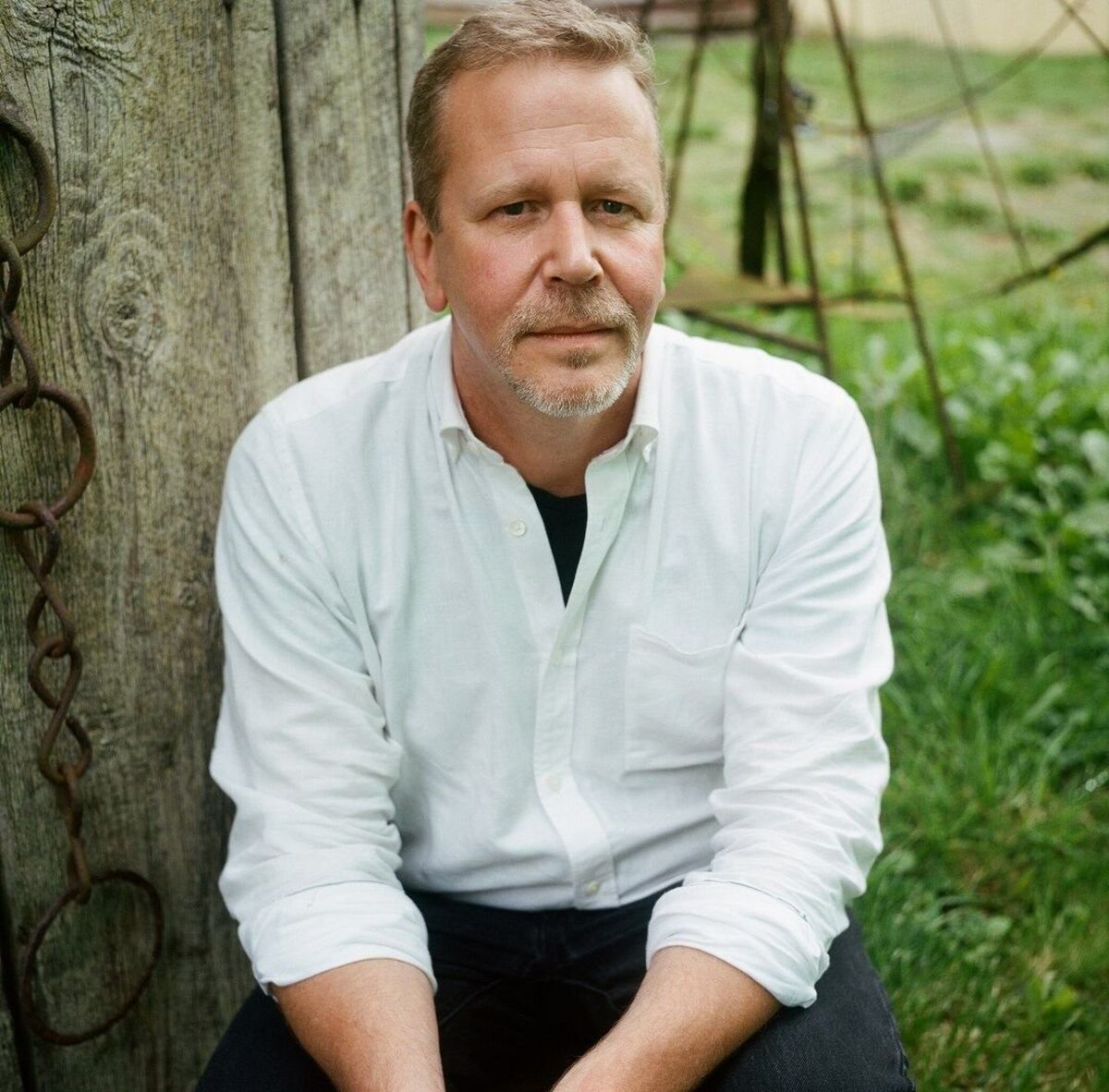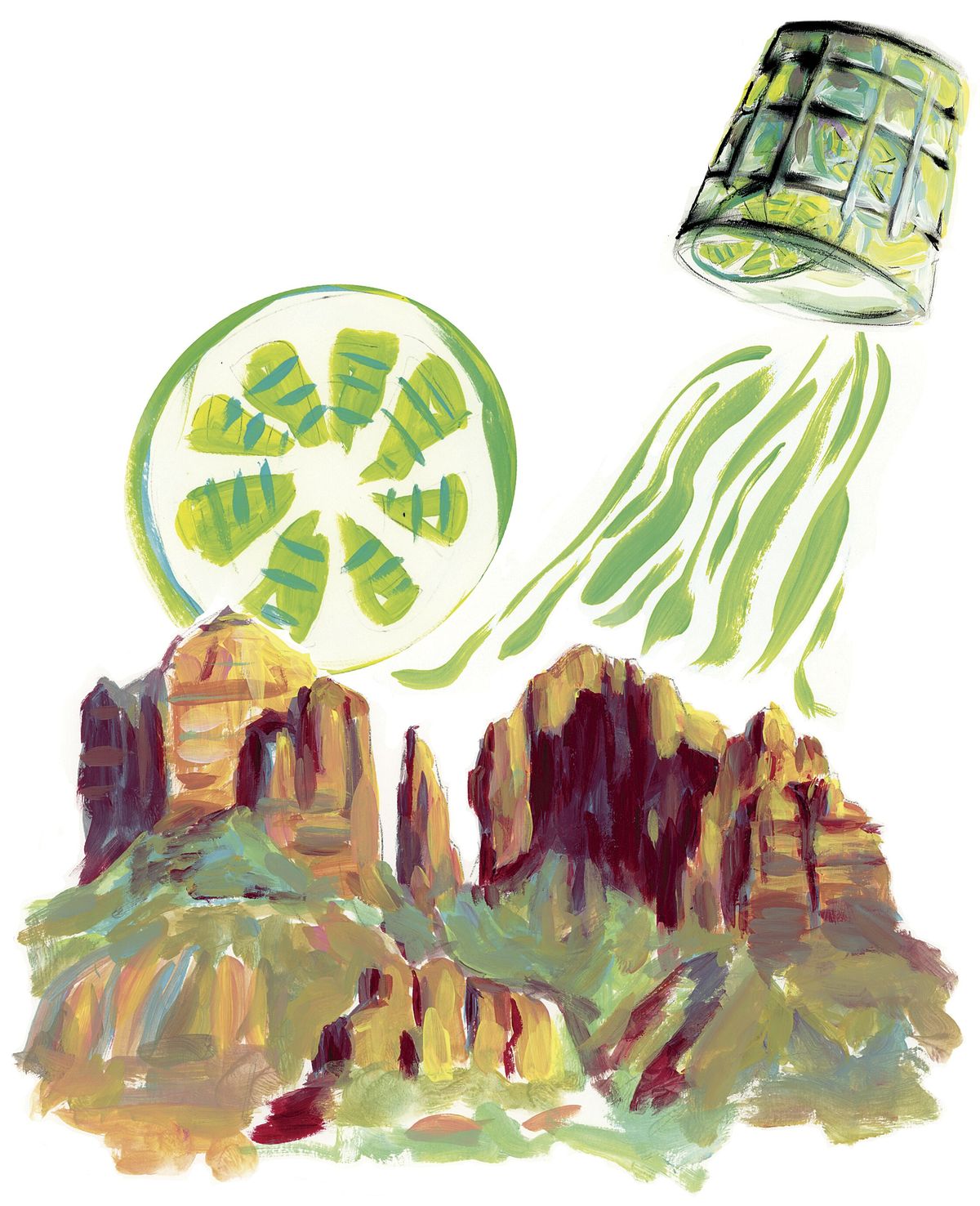Summer Stories: ‘He’s Gone’
Samuel Ligon is the author of “He’s Gone” for Summer Stories 2023: Ghost Stories. (Courtesy)
My father suffered a massive heart attack at the Bell Rock vortex in Sedona, a fantastic upflow site according to my mother. He was only 87. “It must have been the energy from the vortex,” my mom said.
“That killed him?” I said.
“That comforted him,” Mom said. “The earth took him into her arms.”
His own father had lived past a hundred, and Dad still had four brothers, ages 89 to 96, who did Iron Man triathlons and ate sticks of butter for breakfast. My siblings and I flew down from all over the country to be with Mom in Sun City, where she and Dad had retired.
“He hated this place,” Tyler said.
“No, he didn’t,” Carla said.
“And now Mom’s going to keep his ashes in the garage?”
“Only until she finds the right place for him,” Kristi said.
We were drinking gin and tonics on the patio. It was close to midnight and finally below 100 degrees. Mom had gone to bed hours earlier.
“At least she’s got plenty of dough,” Tyler said.
“It’s not about the money,” Carla said.
“It would be if there wasn’t any.”
“I’m just glad he found peace,” Kristi said.
“What makes you think that?” Tyler said.
We’d been there a week and were leaving, one by one, over the next few days.
“I went to the vortex after yoga yesterday,” Kristi said. “His energy was everywhere. It’s like he was saying he was OK – that we all were.”
Carla shot Tyler a look to keep him quiet.
I didn’t believe in vortexes. I didn’t think any of us did. We’d been raised Methodist.
Our mother opened her sliding door and stepped onto the patio.
“Hi, Mom,” we said.
Tyler pulled another chair into our circle so Mom could join us.
The cicadas roared even louder than the lawnmowers during the day.
Mom took a sip of her kombucha. “We used to swim out here in the nude,” she said.
The four of us looked at each other.
“I know,” she said. “Nobody wants to think of their parents in the nude.”
“It’s OK,” Carla said.
“I think it’s sweet,” Kristi said.
“I don’t know what I’m going to do without him,” Mom said.
“You could move back to Spokane,” I said. “And live with me.”
I was still in the house we’d grown up in.
“That’s nice, Tommy.”
“Or you could move to California,” Tyler said. “And live with me.”
“But the fires,” Kristi said.
“And the people,” Carla said.
“I think I belong where I am,” Mom said.
Everyone took a drink.
“Another thing we did out here,” Mom said, “was smoke marijuana.”
“Really?” I said.
“I hope that doesn’t alarm you.”
“It kind of does,” Tyler said.
“There’s so much you don’t know,” Mom said. “I joined a coven when we got here. And Dad joined a men’s peyote group.”
“Really?” I said.
“Maybe that’s why he was so peaceful these last few years,” Kristi said.
“Do drugs make people peaceful?” Tyler said.
“Those aren’t drugs,” Kristi said. “They’re plants.”
“But he also liked acid,” Mom said. “It was easier on his stomach than shrooms.”
Our father had been a banker, a golfer, a Republican – back before Republicans were insane. And then an independent. A Methodist. And then an agnostic.
“There’s so little you knew about him,” Mom said. “And yet you know it all.”
She pulled a joint from her wrap. Kristi handed her a lighter.
“Did you know Mom and Dad were smoking,” I asked Kristi.
“Stop it,” Carla said.
“She knew?” Tyler said. “And didn’t tell us?”
“What about crack?” I said.
“Enough, Tommy,” Carla said.
She was the oldest and I was the youngest. Tyler and Kristi were in the middle.
“We weren’t drug addicts,” our mother said.
She handed me the joint. I passed it to Kristi, who took a hit.
“We were on a spiritual journey,” Mom said.
“I think it’s wonderful,” Carla said.
She and Kristi and our mom smoked the joint.
A few weeks later, our dad showed up in Spokane.
I was in the garage, making a bookcase and listening to the Dead. I didn’t plan on going to work ever again. The bookcase would be enormous – 10 feet by 8, requiring boards across the back to keep the shelves from bowing. No one would mistake it for a carpenter’s work. Jerry was singing “He’s Gone” from a show I hadn’t heard in years, Cincinnati, 1985, an echo effect on his vocal as he repeated the line “Nothing’s gonna bring him back,” so that his voice seemed to chase itself in waves. Sasha and I had been at that show all those years ago, peddling sandwiches and acid. We’d been on the road for months, selling doses in sheets, a hundred hits at a time, to limit our transactions. This was before people got busted on tour. We were in love and on the road and there was no reason any of it would ever end.
“But of course it had to,” my father said.
I looked behind me, but no one else was in the garage.
“What’s that?” I said.
I turned down the music, rested my paint brush on top of the sealant can.
All I could hear was the whine of weedwhackers and leaf blowers up and down the block.
“Dad?” I said.
I listened for a while, but there was nothing. I turned the music up, went back to my bookcase. Sasha and I had been untouchable that summer, everything spread before us as we considered our options. Maybe I’d become a filmmaker. Or a muckraker, taking it to the man.
Work called the next morning but I didn’t answer.
There was always another bad job to be found.
“Maybe you should have ratted somebody out,” Dad said.
I was half asleep, slowly waking, so he didn’t feel like a ghost yet.
It was more like a dream.
I knew he was referring to my time in prison and how I might have avoided it.
He had not always been a benevolent force, but he did visit me more in the can than anyone else. Far more. And he paid for my lawyer.
I kept my eyes closed, drifting in bed, listening for my father.
He showed up again a few days later in the garage.
“I used to like the acoustic songs best,” he said. “Now I like them all.”
“When did you become a Deadhead? I said.
I don’t know if I actually said that out loud. Or if he was saying anything aloud.
“Way, way back,” he said.
“What’s peyote like?” I said.
“It’s like trying to be born,” Dad said.
“I haven’t done anything like that in years.”
“What are you afraid of?” he said, and I said, “Just … everything.”
Dad remained silent.
“Where do you go when you’re not here?” I asked him a few days later.
“Pretty much everywhere.”
We were listening to an acid test, Jerry singing “Death Don’t Have no Mercy.”
“What’s it like being dead?” I asked him.
“It’s like the rodeo,” he said. “Or like really bad traffic, finally loosening up.”
The Dead were working their way into “Dark Star.”
“I never understood this song,” Dad said. “The transitive nightfall of diamonds – what’s that supposed to mean?”
“Well,” I said, “I think,” and Dad said, “Don’t try to explain it. You’ll ruin it.”
“Dark Star” went on and on and when it was over he was gone again.
I called Tyler and asked if our father was visiting him.
“What do you mean?”
“He’s here,” I said. “In Spokane.”
“You can see him?” “Not yet.”
“What does he want?”
“I think he wants to be near me.”
“Sure he does,” Tyler said.
Kristi called and said, “Tyler thinks you’re having a mental health crisis.”
“I feel sorry for Tyler,” I said.
Carla called and said, “What’s going on, Tommy?”
“Nothing,” I said.
“Well, don’t tell Mom about this. She thinks he’s at peace.”
“Who’s saying he’s not?”
“You are.”
“It’s weird,” I said. “He sounds a little like Jerry.”
“Garcia?”
“He sings along with the shows I’m listening to in this weird high harmony.”
This part wasn’t true yet.
“Is this some kind of flashback, Tommy?”
“No,” I said. “Flashbacks aren’t real.”
“But this is?”
I started on another bookcase and kept listening to “He’s Gone” from different shows I’d been at with Sasha. Things had been perfect between us and then went bad all at once. She got busted at a show in Saratoga and rolled on me. I never would have done that to her. “I couldn’t think of anyone else to name,” she said. “I didn’t know those guys like you did.”
What does it say about someone that his own girlfriend would rat him out?
She apologized in letters to jail, but I couldn’t forgive her. She wanted me to roll on someone the way she’d rolled on me. “You don’t owe them anything,” she said.
“But they never did anything to me,” I said.
“Maybe that’s not the point,” my dad said.
I was riding my bike on the trail by the river, my father floating behind me.
“What is the point?” I said.
“Why don’t you ask that woman at Huckleberries out for coffee,” he said.
I hadn’t been in a serious relationship in years. Maybe I’d try.
Smoke blew in from B.C. and Dad didn’t show for days.
I called Tyler and told him I wasn’t going to work again – ever.
“Tommy,” he said, “you need help.”
“I know,” I said. “Who doesn’t?”
“Right,” he said. “But none of what you’re saying is true – the vortex, the peyote, this prison nonsense, even our names.”
“I know,” I said.
“So stop it.”
“Why?”
“Because Dad wouldn’t like it.”
“Yes, he does.”
“Why don’t you say what really happened.”
“Like what?”
“That he died,” Tyler said. “In Chicago. That he’s haunting you.”
“I am saying that.”
“Tommy,” Tyler said.
Or maybe he said my real name.
“I have to go,” I said.
“You’re OK,” my father said, later that night. “You’re going to be fine.”
“I know,” I said. “But are you?”
“Sure I am,” he said. “And I’ll keep coming by.”
“Is something unresolved?” I said. “Some piece of unfinished business?”
“Is that what Tyler thinks?”
“I don’t know what Tyler thinks. I made him up.”
“Then you should know exactly what he thinks.”
“Good point,” I said. “But I don’t think he thinks anything.”
“Then what does Paul think?”
“He wants to see you,” I said. “So do the girls. You should visit them.”
“I will,” he said. “But let me tell you something: it’s all unfinished business.”
I couldn’t tell if that was comforting or terrifying or neither or both.
“I’m not sure you’re really here,” I said.
But he was already gone.

